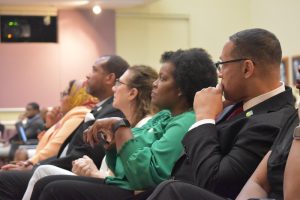The current and past leaders of the Durham County commissioners agree that board members need racial equity training. But getting started has been bumpy.
At a meeting on March 8, County Attorney Lowell Siler recommended The Robert Bobb Group as trainers. But after a tension filled discussion, most commissioners voted to require proposals from two more consultants instead, a move that angered the Durham Committee on the Affairs of Black People and others.

Siler was visibly exasperated. “I think you all know that you need something as soon as possible,” he said.
This was just one of a series of disputes involving commissioners, ranking county staff members and two local political actions groups over the past 14 months. Strife may surface again this Tuesday, during a planned virtual town hall event.
The public got a first glimpse of allegations of racial discord within county leadership in February 2020. That’s when County Manager Wendell Davis, who is Black, wrote a letter to Commissioner Heidi Carter, a white woman, accusing her of “a consistent pattern of disparate behavior towards me and employees of color.”
“I am now concerned that it is due to an inherent bias that you harbor not merely towards me, but people of color in general,” Davis wrote in the letter, which all commissioners received.
After INDY Week published the letter, commissioners hired Duke University law professor James Coleman to investigate. Coleman concluded that “none of the behavior about which Mr. Davis complained was motivated by racial bias on Commissioner Carter’s part.”
But Coleman called out the board for being in a “state of periodic dysfunction” and “a troubling lack of trust and meaningful communications” between the board and the county manager. Coleman recommended that the five-member commissioners find a constructive way to move forward.

Both former chairwoman Wendy Jacobs and current chair Brenda Howerton have said commissioners should receive racial equity training. A desire to do so with the School of Government at the University of North Carolina, Chapel Hill last fall didn’t work out, Jacobs said on March 8.
That night, representatives of the Bobb group presented a training strategy whose first step would be assessing the scale of the problem among commision members, Bobb team member Clara Axam said.
After the presentation, Jacobs said board members weren’t given a chance to craft a needed plan in advance, including the training’s timeline, its scope and what would be made public and kept confidential. On top of that, she said, the Bobb group’s almost $50,000 price tag was “astounding.”
After commissioner Carter made a motion to pursue training after county staff brought two more training proposals to review, only Howerton opposed that plan.
Commissioner Nimasheena Burns, who took her seat in December, said she voted for requiring more proposals to serve due diligence when making spending decisions. She stressed, however, that the county manager is not the only county employee who observes bias. “This is not about one particular employee, there is a sea of employees here who feel abused. That is why we are doing this training,”she said.

The Durham Committee issued a statement on March 22 saying commissioners should apologize for the “blatant disrespect shown” at the meeting. “The community witnessed first-hand how certain county commissioners treat Black county staff and a Black consultant seeking to provide much needed, individualized services,” the letter read.
Charges of disrespect are inaccurate, Jacobs, Carter and Allam stressed in written statements. Their reluctance to make a hire was rooted in favoring procurement practices that seek bids for sizable contracts, each stressed.
The influential People’s Alliance has weighed in on this strife too, but by taking aim at Davis. The left-leaning political action committee on March 8 urged commissioners not to renew Davis’ contract, which expires in June. Davis is too moderate and is paid too much, the group argued.

Racial Equity Talks has organized a virtual town hall for Tuesday to discuss, among other things, whether Davis is being targeted for alleging that he perceived a white commissioner’s bias.
“Durham, North Carolina, self-professed and outwardly perceived as one of the most diverse, equitable, and inclusive communities in America, is in a battle for its racial soul,” reads the dramatic description of the 6 pm event.
Leaders of the People’s Alliance initially declined to participate, but have changed their mind, Millicent Rogers, the alliance’s co-president said Wednesday.
“After more thought, we decided that we had more to say and we are prepared to make those statements during the town hall,” she said.
Rogers, according to a poster promoting the event, is slated to participate in a segment titled: “Black Public Leadership and White Liberalism: The Case for or against Wendell Davis.”
9th Street Journal reporter Dryden Quigley can be reached at dryden.quigley@duke.edu



